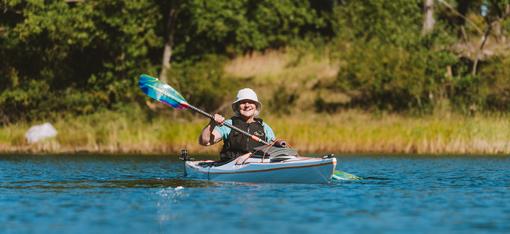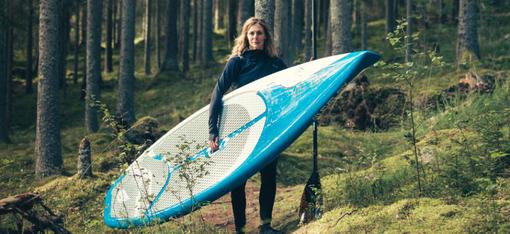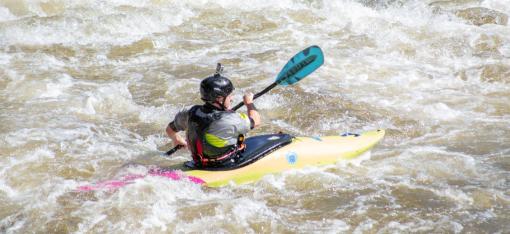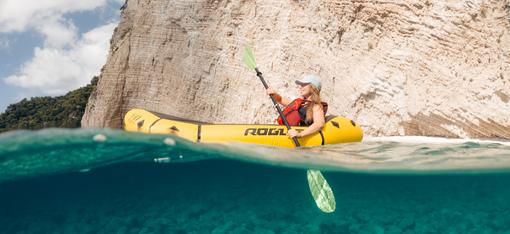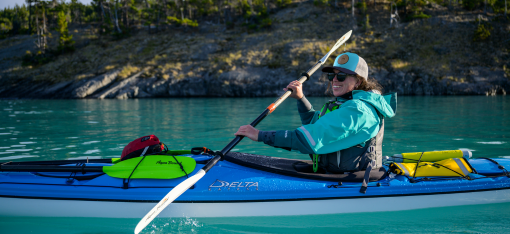What Challenges do Women Face in the Kayaking World?
10-minute read
Are there challenges women face in the kayaking world that men don’t? That’s what we’ll explore here, with direct input from some kayaking women.

(photo courtesy of @redpearlgirl)
Molly Hagbrand, a member of Aqua Bound’s Ambassador Team, is a professional sea kayak guide and instructor. Earlier in 2022 she led a multi-day womens-only kayak trip in Mexico’s Baja region through NOLS (National Outdoor Leadership School).
She and three of the women who joined that trip generously shared some of their insights in how they view the challenges and opportunities for women in the kayaking world—and the outdoor recreation world in general.
(Question for Molly) Is it intimidating for you, as a woman, to be a kayak instructor?
MOLLY: I do not feel intimidated teaching, and did not think about the differences being a woman in the outdoor world until it became obvious to me that there is a difference. That’s when I started opening my eyes to it.
It has been a growing realisation that I am treated differently than my male co-workers. One example of this is when I teach a specific technique or skill and then the male instructor gets approached with questions. And even if there’s a general technical question, it usually goes to male instructors.
It’s so awesome to work alongside men who are aware of this, and instead of answering the question they re-direct it back to me. I don’t find it intimidating, only frustrating at times.
Q: Was learning to kayak intimidating for you?
FRANCIS: No, because I had experience paddling. But it is intimidating when taught by an experienced male instructor, because I can feel like I need to prove myself and my skills.
SAMANTHA: It was not intimidating at all—in fact it was great fun! I learned [to kayak] at an inner city “play scheme,” so it was heavily subsidized. I learned in a filthy canal, which was terrifying (if we capsized, we'd end up tangled in junk or weeds), but as a kid it was brilliant to explore the city from the waterways. I was lucky to be part of that. As an adult I think it might be harder and cost a lot more.

(photo courtesy of Neil Irwin)
LORIANN: No. I was raised by a man who, for the first 13 years of my life, trained, drilled and taught me as though I was male (I’m the first born). Further into my life I had four sons. Raising strong, self-sufficient young people hasn't allowed me to use “being a woman” to intimidate me.
Q: Do you personally feel any barriers to women in the outdoor recreation world?
MOLLY: There definitely is a difference between men and women in how we approach things—not saying it comes down to everyone, but through my years of teaching I’ve seen trends.
Men are not afraid of just trying, while women are more conservative and take things at a slower pace. I think this is where the barriers come: not feeling like you can keep up or dare push the limits in the same way, because we think differently.
As instructors it’s easy to teach the way we learn and the way we prefer to learn. This is a trap for men and women. If the majority of instructors are males teaching in the way they learned, it will benefit those who prefer that way of learning. But if you don’t have fun the first time, you are most likely not going to go again. I think this is one of the barriers.
When teaching groups of all women, the development of technique goes quicker. There’s usually different support from the group, and you feel safer challenging yourself. When everyone feels safe to try in a group, that’s when we can develop skills quicker and push the limits.

(photo courtesy of @rob_mcnamee)
FRANCIS: I think that since many outdoor guides are men, it can result in guides not expecting as much from the female participants. Or they do things for women instead of teaching them the skills. It can make women participants feel less comfortable asking questions, asking to learn a skill that requires hands-on support, like rolling, or speaking up if something isn’t comfortable about the trip.
I have led trips where I have been sexually harassed by another guide or participant. I also know of women who have been sexually harassed by their guides. This can make women feel unsafe going to the backcountry, and feel trapped without resources to handle a traumatic event.
Women can feel underrepresented. There can be a lack of understanding for women-specific experiences such as pregnant women wanting to roll a kayak, or getting her period on trail. Studies show women learn best from other women when it comes to outdoor skills, so it would be beneficial to have women role models in different outdoor skills.
SAMANTHA: I do think there are barriers. Culturally, it can be tough for women heading out on their own. There’s a perception that if anything happens, it's your fault because you’re traveling solo.
Harassment is ridiculously common. The number of men who feel it’s okay to comment on your ability to hike, climb, run is astonishing. The barriers are even greater for women (and men) of color or the indigenous community for a myriad of reasons.
Outdoor activities can also require expensive gear, or a large initial outlay. I dip in and out of kayaking (no pun intended), so I participate via organizations like NOLS. Trips like NOLS are expensive. Though I understand why, that’s a considerable barrier for many.
Where I live there are paddling groups, but they tend to be mostly men. While we can borrow kayaks, the trips often sound intimidating. I’m not sure a beginner wants to go on a 10-mile paddle with a bunch of experts!
Here in Seattle, there are lots of places to rent a kayak, but most do not include instruction. They assume you know how! I imagine that may put a lot of people off.

Start ‘em young! (photo courtesy of @happypaddlin)
LORIANN: In my mind and experience, no. I believe in today's times one who feels or thinks that [there are barriers] is doing it to themselves.
Q: How has this multi-day kayak trip impacted your life personally?
FRANCIS: Backcountry expeditions allow me to make lifelong connections with other women that share my passion for the outdoors, understand why I enjoy these trips and can be partners for future trips.
I loved this trip because I could be empowered by other badass women. I could talk about my experiences as a woman with people who understand lived experiences. And I could build my hard skills and really push myself in a comfortable, safe setting.
SAMANTHA: The NOLS trip was amazing! It helped me emerge from Covid purgatory. It restored my sense of community. It refreshed me!
It was wonderful to step away from my everyday life where I am a colleague, manager, parent, partner, daughter etc... and just be in the moment. That is vital to maintain a sense of self and is also a massive confidence builder. So it had a big impact upon me personally, and I have come away with some super friends!
LORIANN: It has given me the inspiration, again, that I can do what I put my mind to. I was depleted in many ways, and the comradery with this amazing group of woman—different ages, religions, ethnicities, careers and kayaking skill levels—has shown me so much is possible. And also that what I bring to the table is just as worthy.
Q: What do you suggest for women who want to enter the outdoor recreation world?
MOLLY: Get out there—it’s fun! Find people around you who you feel safe exploring with. Don’t be afraid to contact folks through Facebook groups. Maybe the biggest challenge of all is to reach out to someone you don’t know. But if it’s someone who has the same interests, it’s usually easy to get going.

(photo courtesy of @Five2Nine)
FRANCIS: Find a friend who can make you feel comfortable and to try an outdoor skill set together. Find programs that are tailored to women with female guides or instructors. Encourage women in outdoor clubs or sports to go outside their comfort zone.
Talk about outdoor challenges that are women-specific, like periods in the backcountry, so women feel seen. Teach guides to address unconscious bias toward women. Make gear for women that are meant to be used and are practical.
SAMANTHA: Find an inclusive group near you. Facebook has been great here in Seattle. There’s a group called Pacific North West Outdoor Women (PNWOW). I’ve learned a ton from them without even going on trips.
If you can’t find a group, start one if you have the energy. You can pick up tons of gear from buy-nothing groups or Craigslist for free. For hiking, you can do it in sneakers and a raincoat. You don't need fancy gear to get started. Grab a friend and get out!
LORIANN: Just do it! I will say without a doubt, this week that I shared with this group was beyond special. I truly believe that the interest, the knowledge, the wanting to know and to be known by the instructors of our women's sea kayaking expedition embodied this.
For them to set the tone of open, honest, loving, understanding leadership allowed each of us to share likewise. This made the bond we all have now a very rare and priceless chapter in our lives. We continue to share tidbits of our lives with each other. I believe we are all connected for life now!
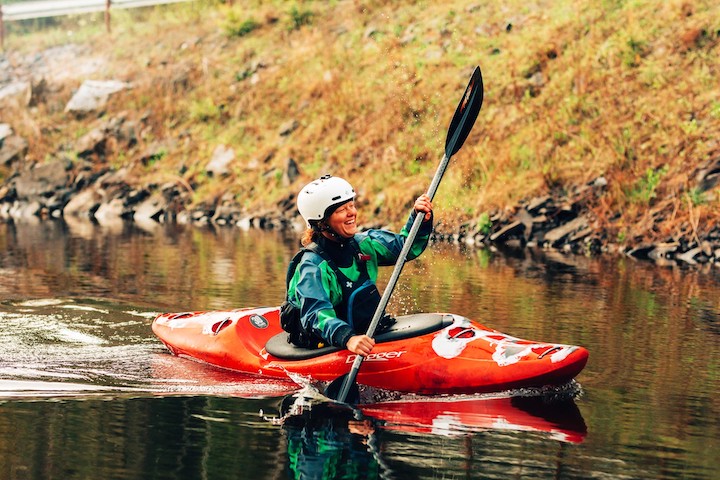
(photo courtesy of @jay_siemens)
Do you have paddle questions our friendly Customer Service Team can help you with today? Contact them: 715-755-3405 • sales@aquabound.com
More for you...

